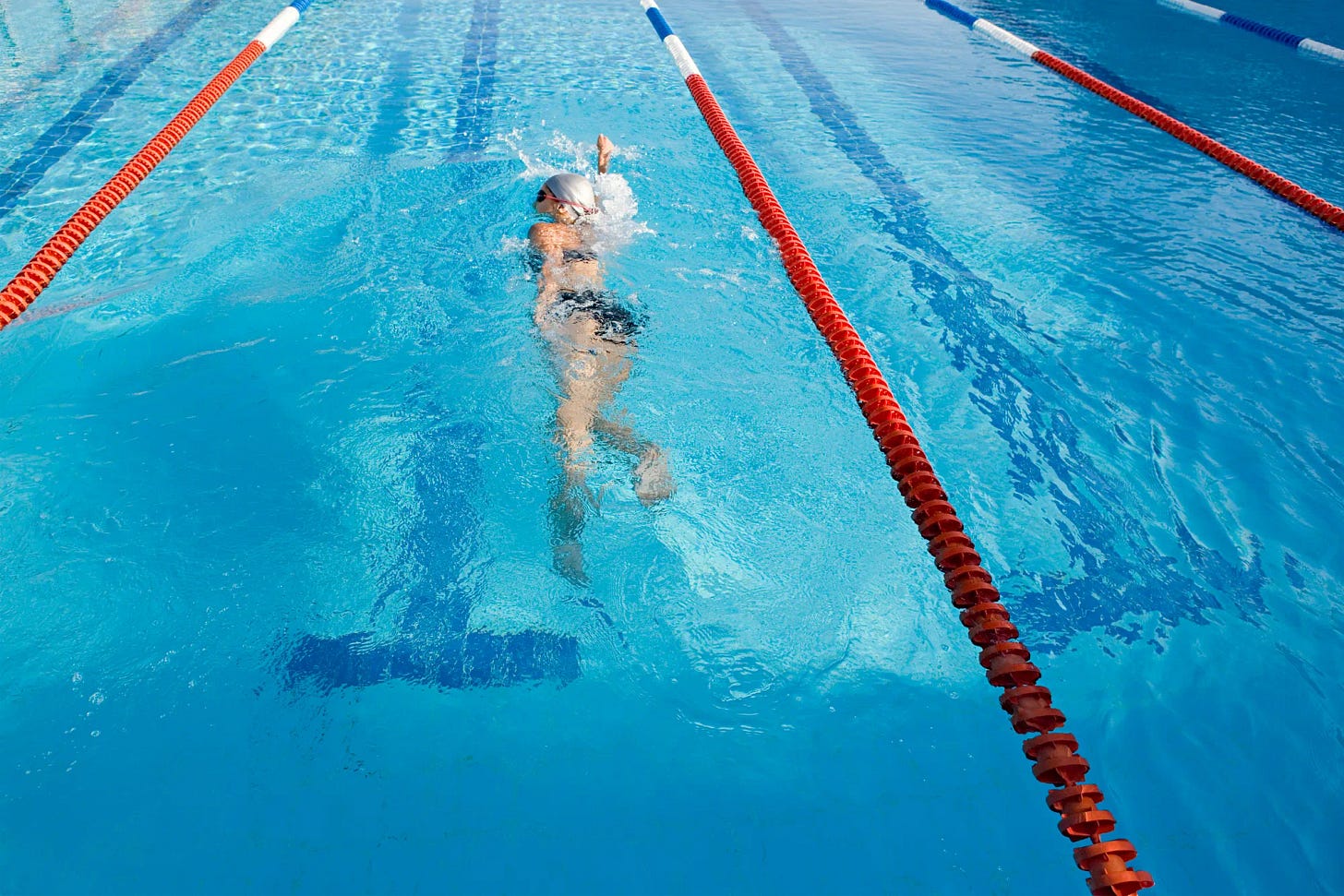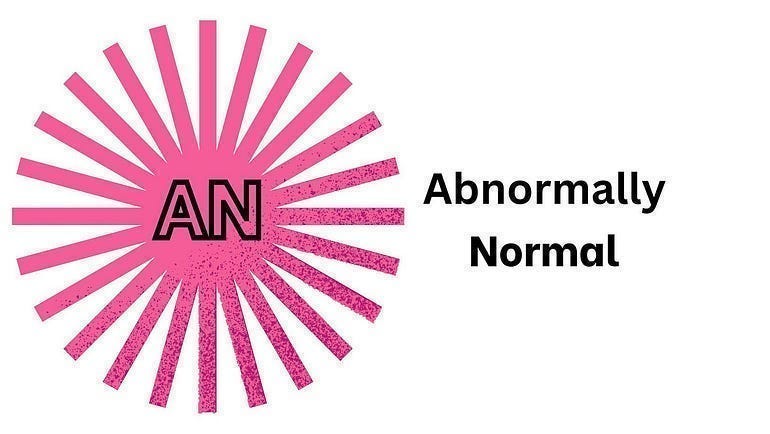Why People With ADHD Do Better in Individual Sports Than Team Sports
Finally, my loathing of school hockey makes sense

If you read AN regularly and benefit from the content, why not share it with a friend?
I stood engulfed in misery, wishing I were anywhere else but there. Rigid with cold and awkwardly clutching a hockey stick. Relegated to the position of defence, I was often away from the action. Although I can understand why — I didn’t know what I was doing. I didn’t know the rules. I didn’t care for the game.
To be honest, I was only there to try and fit in, to be included. To do what everyone else was doing. But it was painfully boring.
The other girls ran around like a pack of spaniels. Tongues lolloping out and drooling with enthusiasm. They hooked themselves into the strategy of the game, its purpose. They yelled and wailed passionately. And yet, to me it all just felt a bit pointless.
Eventually, I gave myself permission to fade away from the hockey scene. But being at a school obsessed with hockey and rugby, I was discarded into the “not sporty” pile and ignored by the physical education teachers.
So rejected from the sporty label was I, that when I went on to win the school cross-country, beating all the hockey girls with ease, the same teachers who cast me aside doubled down and couldn’t even bear to congratulate me! Because I wasn’t one of their girls. I wasn’t supposed to be good at sports.
But I was good at sports. Just not the sports they wanted me to be good at. I didn’t want to play sport. I wanted to do sport.
It turns out the exercise I was drawn to was in keeping with my ADHD brain.
So what do the experts say?
When I talk about team sports, I’m mainly talking about ball sports.
The number of moving parts in team sports can topple some of us over the edge if we already have brains that are susceptible to overwhelm.
This article is ADDitutde, an ADHD specialist magazine, highlights the way the sports field can exacerbate the difficulties of children with ADHD.
Because structure, order and lack of distraction are the keys to sports success, the very issues that plague them in the classroom may get magnified on the playing field.
It also says
ADHD frequently co-occurs with learning disabilities that affect organization, spatial awareness, and game concepts and strategies.
It then named four areas where children with ADHD may struggle most in sports teams. “Difficulty following direction”, “impulsivity”, “inattention” and “low frustration tolerance”.
Reading this hit me hard. I struggled with the rules of team sports. I always thought it was because I was never taught the rules. I joined my school later than many of the other girls, and by this time, it seemed like everyone knew the rules. I tried to learn through playing, but I just couldn’t decipher them.
In this article in Psychology Today by Claudia Skowron, a clinical professional counselor, we learn about one of Skowron’s cases; a 15-year-old boy with combined ADHD, whose parents were at their wits' end. Knowing that exercise helps ADHD symptoms, they said they had tried everything and reeled off a list of team sports, but he “goofed around” and even got kicked off the soccer team. And his symptoms worsened.
Skowron suggested they try swimming.
Swimming seemed to be the magic bullet. The boy excelled, winning a scholarship for a swimming college, but perhaps most notably, his overall grades improved and impulsivity was decreased.
In providing a theoretical explanation for this change, Skowron said:
Typically, sports that may have too much downtime, such as football, baseball, or golf, tend to be less beneficial as can sports with too many rules or play changes, which can become overwhelming. Further, team sports tend to benefit those with attention issues, while individual sports tend to benefit those with hyperactivity or impulsivity.
Something my psychiatrist shared with me during my own ADHD assessment has stuck with me, and I believe all those with ADHD should be aware of this. Studies show us that aerobic exercise (my psychiatrist specified running) is as good as a low-dose medication for treating the symptoms of ADHD.
Funnily enough, I knew this instinctively
Interestingly, at university, where I studied psychology with sports science, my dissertation explored the effect of exercise on cognition. I knew from personal experience the benefits of exercise on my ability to think and function, and I wanted to examine whether this was a widespread occurrence — it was. I just hadn’t joined the dots with ADHD as yet.
I have to admit, reading the link between sport and ADHD is extremely validating. As a child, I just thought I was crap at sport. Yet, I couldn’t understand why, as I loved movement and releasing energy. I thought I was a team player, and fitness wasn’t a problem. So my ineptness complexed me. But I could never explain my brain’s resistance to team sports… until now.
When I found running, I fell in love. A hopelessly besotted infatuation. Finally, something that untangled the ball of yarn in my brain instead of adding to it.
As a teenager, eager to meet my mum in a sport that she loved, I dragged her to the squash court. We only got about 10 minutes in before I felt my soul evaporate.
The first nine minutes were fun. But then the clock seemed to be moving backwards. Time dragged. Sure, I was pretty crap and my mum was thrashing me. But I’m not a sore loser. My enthusiasm waned, and my attention faded. My brain couldn’t latch on to the rhythm of squash, rendering me grumpy and frustrated. I lost interest. And when an ADHD brain loses interest, it’s gone, checked out, never to be seen again.
I have spaghetti brain enough without participating in a sport that adds to this sticky gloop. All the moving parts of team sports adds tangles to an already tangled brain. Running was my saviour.
Running and swimming and cycling and kayaking and walking and yoga and strength work… they all help me create order out of chaos. Even typing out the list of exercise I enjoy doing felt calming and methodical.
I feel similarly about board games. Or maybe I should say bored games. There are not many of these that I can handle. I can’t get through many board games without my soul wilting and my eyes glazing over.
What does this mean for people with ADHD?
Look, this doesn’t mean that anyone with ADHD can’t play team sports. They absolutely can. And if you enjoy team sports and thrive in them, great, keep at it.
But, for those of us who have always struggled with team sports and then just assumed we weren’t a team player, or weren’t actually sporty, maybe this information will quell the inner voices of negativity and shame.
Instead of trying to force yourself into types of exercise that fry your brain and don’t provide an iota of joy, view this as permission and encouragement to stop. Choose your exercise wisely.
The ADDitude article quoted above suggests some modifications coaches can make to accommodate ADHD minds. This includes regularly changing drills and playing positions to prevent boredom. Putting players with ADHD in positions that are most involved in the action, and giving those with ADHD specific jobs to build their sense of purpose and keep them engaged.
The other weekend I tried padel for the first time. It didn’t take long before I consigned another sport to my mental graveyard, along with hockey, netball, tennis and bored games. Nope, padel is not for me, which is a shame, as I know many people who love it. I wanted to love it, but alas.
I also played singles table tennis and pool for the first time in ages. I’d forgotten how much I loved these. I thrived and felt fully engaged.
My point is — don’t waste time trying to force yourself into a sport that you think you should play. Recognise the needs of your brain and surrender to them because there are plenty of activities that the ADHD brain will latch onto and find a flow in.
I think the same goes for watching sports.
I love the idea of sitting down and watching national sporting matches. Particularly Ireland versus Scotland, given I am Scottish and my husband is Irish. But my enthusiasm is short-lived as boredom takes over. As much as I try to learn the rules, they slip out of my brain. I’m just not interested, and my brain knows this. I’ve wasted years hiding my lack of interest in rugby and football, while many people around me are consumed by it.
Heck, even the simpler rules of tennis evaporate out of my brain almost instantly, and each year, if I’m somewhere with Wimbledon being televised, I have to relearn the scoring system.
It makes me feel stupid. It feels shameful and infantilising.
But now I know better; I am learning to treat myself with more grace.
I get it — sport helps children build social connections and teaches them to be part of a team. But as much as we try, we can’t force a square peg through a round hole. I can’t help but wonder how many parents out there force their children to play sports that aren’t conducive to their ADHD brains.
I recognise now that my inability to thrive in team sports was a contributing factor to feeling like I didn’t fit in in certain environments. If I knew then, what I know now, I could have saved myself an awful lot of negative feelings.
Finding a rational reason as to why I was so allergic to team sports feels deeply validating — even 32 years after trying so hard to be part of a gang chasing a ball around a field.
It turns out that you can be pretty awesome at some sports and rubbish at others. And despite the lack of encouragement from my old physical education teachers, I went on to thrive and excel in running, with numerous podium places in trail races, canicross, and ultra-marathons.
So, you can keep your hockey sticks and rugby balls. I’m sticking to the simplicity of running.
Thank you for reading.
Ali x
Subscribe to Abnormally Normal for more stories like this straight to your inbox.
If you have any sporty, ADHD friends, they may be interested in reading this.
You may also enjoy my other Substack Life Without Children, a place for readers and writers of life without children, whether by choice or circumstance.
You can also find my writings and musings on Medium, where I write about well-being, feminism & personal growth.




Ali - Now this is interesting! I never thought about attention span and the like and individual versus group activities whether they be sports or other activities, either. What you lay out makes a lot of sense.